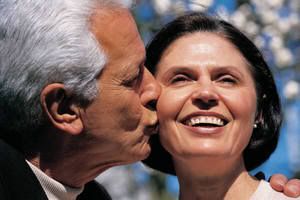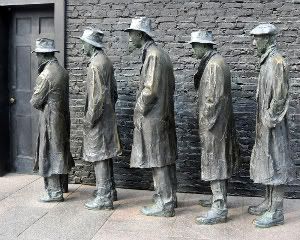Brother John M. Samaha, S.M.
Pope Benedict XVI has proclaimed a Pauline Year in preparation for the 2000th anniversary of the great apostle’s birth. Church historians reckon that St. Paul was born around 10 A.D. in Tarsus, now located in Turkey. Following his conversion to Christianity he became the Church’s foremost evangelizer in spreading the gospel among the Jews and the Gentiles.
The Pauline year will run from June 29, 2008 (feast of Saints Peter and Paul), to June 29, 2009. The purpose is to highlight Paul’s life and his contribution to the spread of Christianity in the first century, and to remind us of our baptismal obligation to spread the Good News.
When Pope Benedict XVI visited the Basilica of St. Paul Outside the Walls to pray at the tomb of the great apostle and to honor his missionary legacy, the Holy Father reflected that “The Church is by nature missionary. Its primary task is evangelization. In the third millennium the Church feels with renewed strength that Christ’s missionary mandate is more pressing that ever.”
The Pauline Year invites us to recall the genius and sanctity and zeal of the Apostle of the Gentiles. The Pope encourages us to imitate what he taught, and to renew our missionary spirit.
The perennial power of Paul
How did Saint Paul do it? What did he speak, write, and do to attract so many to Christianity? He was a dynamic evangelizer, the premier Apostle of the Gentiles. Sitting in a pew, or participating in a Bible study circle in the third millennium, it can still be difficult to fathom the meaning he loaded into terms like “flesh,” “spirit,” and “the world.” But, promise biblical scholars like Father Joseph Fitzmyer, a Pauline authority, there is power to be found in Paul’s letters of faith, proclaimed years before the gospels were composed.
What he said yesteryear fits this yearThe meaning of Saint Paul’s letters is the same today as they were for his contemporaries. They cannot be different. The 1993 Pontifical Biblical Commission instruction, The Interpretation of the Bible in the Church, explains the “actualization” of the word of God. It wants to help us understand what the Bible is saying to us today in the third millennium. God did not speak through the inspired writers only for the people for 2000 years ago.
Beginning with what the scripture text meant for its own time, actualization invites us to do three things: hear the text from within one’s own situation, identify the aspects of the present situation underscored by the text, and draw from the text the meaning that guides us to the will of God. Although the biblical texts have been composed in the languages and circumstances of the past, they reveal their message for us today as we apply their message to present-day circumstances and express it in today’s language.
What was Paul telling us?Paul describes for us the effects of Christ’s redemptive act, what he did for humanity. He comments on the various effects of the redemption as looking at the event from ten different angles. From one angle he explains that Christ justified us – justification; from other angles, he depicts salvation, reconciliation, expiation, redemption, freedom, sanctification, transformation, new creation, and glorification.
Each angle of vision derives from Paul’s Jewish or Hellenistic background and education. He tells us that Jesus Christ justified us, that he made it possible for us to stand before God the judge and hear a verdict of acquittal as one would in a court of law today following a trial. Is there a difference among all these images or facets of the saving act of Jesus? Not really. Christ Jesus did this, and Paul simply uses different images to convey the results.
In examining Paul’s theology, the experts tell us to recast what Paul preached into a form that Paul himself did not use. In this way we attempt to synthesize his teaching.
What Paul proclaimed to his contemporaries, he proclaims to us today.
Paul’s conversionThe Acts of the Apostles gives us three different stories of Paul’s conversion. We find the episode on the road to Damascus in chapter 9, and the others in chapters 22 and 26 recall the incident. But these are Luke’s accounts of Paul.
Only once does Paul write about what happened to him, and this is recorded in Galatians 1. Paul speaks of his call from God. He does not use the word “conversion,” but speaks of his “call.”
Paul is unaware of Luke’s description, and Paul makes no mention of an incident on the road to Damascus. Mainly, Paul recounts his call because he is insisting that he is an apostle, “not from human beings nor through a human being, but through Jesus Christ and God the Father who raised him from the dead” (Gal 1:1). Some people were denying that Paul is an apostle. Paul insists that he is, and struggled to be recognized on the same level as the twelve apostles.
Paul’s letters preceded the gospelsPaul’s letters have special significance because they were written before the gospels. He gave us an interpretation of Christ before the early Church had recorded the story of Christ. The letters that most scholars agree were written by Paul himself (1 Thessalonians, Galatians, Philippians, 1 and 2 Corinthians, Romans, and Philemon) were written between 51 and 58 A.D. The earliest gospel, Mark, was written about 65 A.D. Our earliest portrayal of Jesus of Nazareth, then, is given us by Paul. For this reason, Paul is the first theologian of the Christian faith.
Paul’s theological vocabularyIn Romans 9:5 Paul talks about the Messiah according to the flesh. Naturally he means his human descent from David as David’s progeny.
Paul also talks about the flesh in opposition to the spirit. He does not mean the Holy Spirit, but the characteristics of the human being that at times he calls the flesh and at other times the spirit. Paul does not work with the Greek or Roman idea of body and soul. He regards the human being as a unit. In referring to the human being as flesh or spirit or mind, he is mentioning different aspects of a composite that he does not separate into parts.
When Paul refers to the human being as flesh, he means humanity’s earth-oriented tendencies. When he talks about the human spirit, he means that aspect of the human being’s openness to God and God’s influence. When he refers to the human being as heart, he means the emotive and affectionate aspect of the person. When he talks about the mind, he means the intellectual capacity.
The core of Paul’s theology
What is the heart of Paul’s theology? He himself responds, “We preach Christ crucified.” His proclamation is that God has not done this before in human history, that God has entered human history in a new form. God sent his Son and that Son died for us on the cross. The consequence is the Resurrection.
The key to Paul’s theology is expressed in terms of what he himself frequently stated in various ways. For example, in 1 Corinthians 1:21-24, Paul says, “For, since in the wisdom of God, the world did not come to know God through wisdom, it was the will of God through the foolishness of the proclamation to save those who have faith. For Jews demand signs and Greeks look for wisdom, but we proclaim Christ crucified, a stumbling block to Jews and foolishness to Gentiles, but to those who are called, Jews and Greeks alike, Christ the power of God and the wisdom of God.”
The cross puts Christ Jesus himself at the center of God’s way of salvation. God works the salvation of humanity through Christ Jesus. Everything in Paul’s teaching is oriented to his Christ-centered understanding of salvation.
What would Saint Paul tell us today?
This is not an easy question to answer. But really he has already told us. We would like to locate answers to the problems of our current times in a facile manner by looking into the Bible. But this requires study, reflection, and prayer.
When we read Paul today, we are reading him through the lens of patristic teaching, theological reflection, and the dogmatic tradition of the Church – the Christian wisdom of centuries. Paul gives indication of what is pertinent to our condition, but he does not give the full answer.
The purpose of discussing Paul’s theology is to offer a descriptive presentation of Paul’s Christian faith and to determine especially what Paul meant when he addressed the Christians of this day. This also challenges us to ascertain what his theology means for us here and now.
Paul’s theology is an exposition of the inspired biblical heritage of early Christians that has an existential meaning for our faith today. Paul’s theology is part of biblical theology. In biblical theology we find two poles or aspects: one is descriptive – it describes; the other normative – it prescribes. Paul’s meaning for the faith of people today cannot be anything other than the meaning he intended for his contemporaries.
Reading the letters of Paul today
It is not a simple matter to grasp Paul’s meaning immediately. His letters are not a quick and easy read. When we examine the proclamation of prodigious Paul in his letters, we need to realize that we need an accurate translation and some professional guidance. We cannot grasp his message in a simple glance.
There are some passages of the New Testament to keep in mind when approaching St. Paul. In 2 Corinthians 1:13 Paul says, “For we write you nothing but what you can read and understand, and I hope you will understand completely, as you have come to understand us partially….” Then look at 2 Peter 3:15: “And consider the patience of our Lord as salvation, as our beloved brother Paul, according to the wisdom given to him, also wrote to you speaking of these things as he does in all his letters. In them there are some things hard to understand that the ignorant and unstable distort to their own destruction just as they do the other scriptures.” So we can see that even as Paul’s letters were being collected by the early Church the faithful did not find them easy to understand.
The Acts 8:30-31 when Philip is evangelizing the Ethiopian eunuch, who is reading Isaiah 53, we are told, “Philip ran up and heard him reading Isaiah the prophet and said, ‘Do you understand what you are reading?’ He replied, ‘How can I, unless someone instructs me.’”
We cannot simply open the Bible and expect to understand everything right off the bat. The Greek text of Acts says literally, “Unless someone guides me.”
Saint Paul helps us to recall the wonder of our creation and the greater wonder of our redemption. He inspires us to ponder the Paschal Mystery and to ask God to bring to perfection the saving work he has begun in us.
Passionate, prodigious, perennial Paul, pray for us!

 These prayers by Diana Macalintal first appeared in
These prayers by Diana Macalintal first appeared in

 This prayer by Diana Macalintal first appeared in Today's Parish Minister, 40:4, April/May 2008.
This prayer by Diana Macalintal first appeared in Today's Parish Minister, 40:4, April/May 2008. The
The 

 Below is an announcement for a $1000 scholarship for those participating in graduate studies in liturgy. In 2003, I was awarded the Tabat scholarship which helped me in my studies at
Below is an announcement for a $1000 scholarship for those participating in graduate studies in liturgy. In 2003, I was awarded the Tabat scholarship which helped me in my studies at